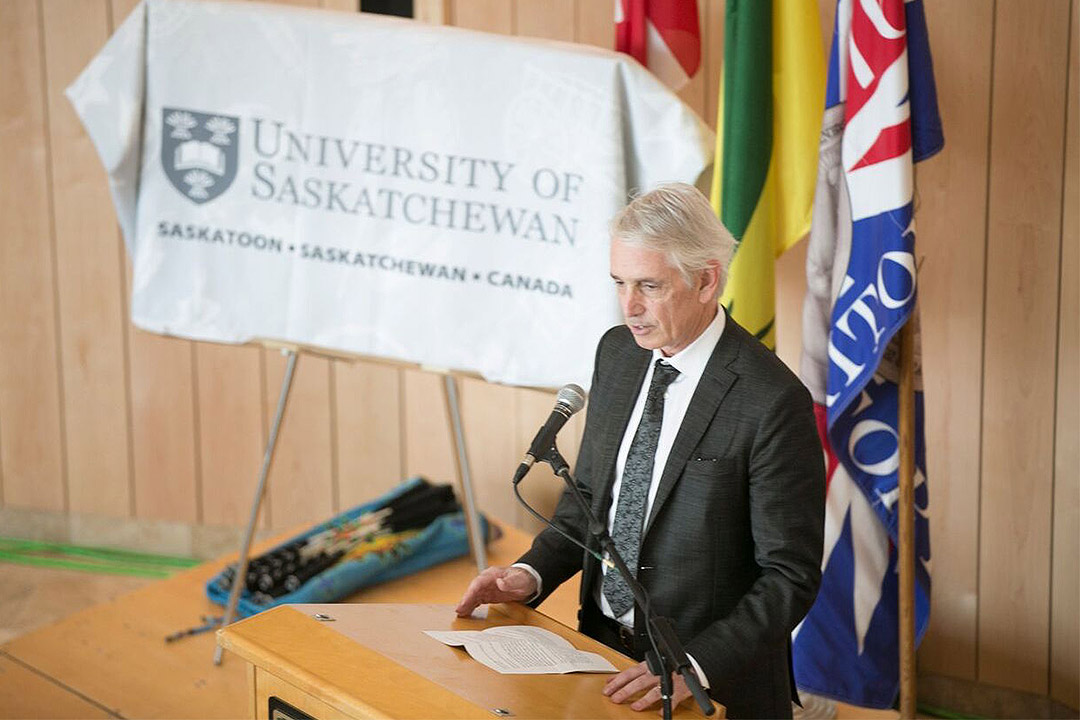
Reconciliation forum another step forward
The University of Saskatchewan was well-represented and well-received at the third national Building Reconciliation Forum at the University of Manitoba last month.
By James ShewagaRegarded as a national leader in Indigenization efforts in post-secondary institutions, U of S representatives shared their expertise at the forum, as Jacqueline Ottmann, Kristina Bidwell and Lawrence Martz were among those who took centre stage in a number of sessions.
“The University of Saskatchewan had a strong, influential presence at the national forum that was arguably greater than any other visiting university in the country,” said U of S President Peter Stoicheff, who was one of the university’s senior leaders who attended the Nov. 7-9 forum—The Journey Toward a Reconciled Education System.
The U of S sent a contingent of 26 faculty, student leaders and senior administration staff members to the forum in Winnipeg, home to the National Centre for Truth and Reconciliation, which has a partnership with the U of S to share archival information.
Bidwell, an English professor and associate dean of Aboriginal affairs in the College of Arts and Science, and Martz, a geography and planning professor and vice-dean of faculty relations in the college, helped lead a session at the forum on improving Indigenous faculty recruitment at post-secondary institutions. Meanwhile, Ottmann was one of the national authorities selected to lead the session entitled Institutional Development: Indigenous Leadership at Universities and Colleges.
For Ottmann, it was her second national reconciliation forum, but her first while representing the U of S after becoming the first vice-provost of Indigenous engagement at the university on Oct. 1.
“The highlight was hearing the residential school survivor stories and seeing the university presidents share their perspectives on commitments to Indigenization and decolonization initiatives,” said Ottmann. “The themes that emerged for me included the importance of authentic and sustained collaborative efforts to support Indigenization and decolonization initiatives, and the importance of truth-telling in reconciliation processes.”
The U of S was honoured to host the first national forum—Building Reconciliation: Universities Answering the TRC’s Calls to Action—on Nov. 18-19, 2015, and continues to be a progressive leader in Indigenization efforts amongst Canadian post-secondary institutions, Ottmann said.
“The University of Saskatchewan has weaved Indigenization into the university plan: from the vision, to the mission, principles, commitments and future aspirations,” said Ottmann, who will lead an internal debrief on the national forum in the coming weeks at the U of S. “Indigenization is fundamental, not a separate initiative or strategy, to the University of Saskatchewan.
“The next steps involve living Indigenization, which includes drawing upon Indigenous knowledges, learning Indigenous perspectives on histories, traditions, languages and philosophies … All of this should be done with appropriate protocols and with the utmost respect. These commitments will have the university actively create, repair and work at sustaining relationships and redressing past wrongs.”
To that end, the U of S is weaving Indigenous content, drawing from Indigenous knowledges, worldviews and experiences, across the full spectrum of academic programming.
“Content drawn from Indigenous experience and ways of knowing is being incorporated into all our degree programs across campus—not to supplant traditional western understanding, but to enrich it, offer alternatives to it, acknowledge thousands of years of deep learning that occurred here long prior to it, and give all students a richer, more informed and ultimately more compassionate understanding of the world,” wrote Stoicheff in a recent Saskatoon StarPhoenix and Regina Leader-Post op-ed piece. “Through this, the U of S will be an even better university.”
Participants will head west for the fourth national forum, to be hosted by the University of Victoria in 2018.

